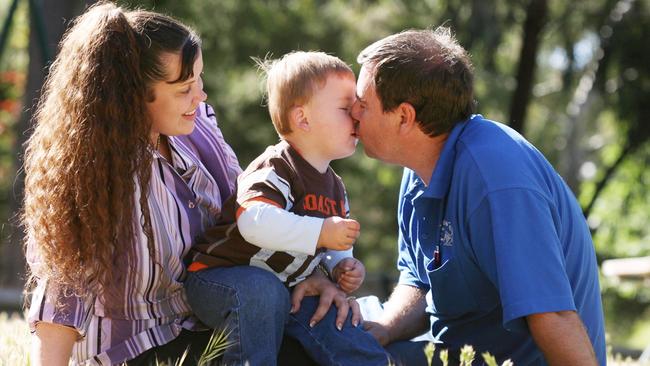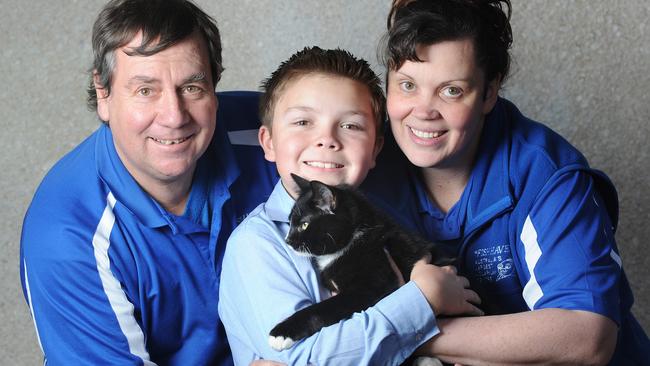Would-be mothers look overseas as wait continues for local register
LAWS to make surrogacy for South Australian women easier passed State Parliament eight months ago but the Government has only just started drafting the regulations needed to establish the register.

SA News
Don't miss out on the headlines from SA News. Followed categories will be added to My News.
HOPEFUL mothers-to-be are resorting to interstate or overseas surrogates as they wait for the State Government to develop a promised register of local women who could help.
Laws to make surrogacy for South Australian women easier passed State Parliament eight months ago but the Government has only just started drafting the regulations needed to establish the register.
Meanwhile, women who could benefit from the changes are left waiting.
“Our bodies are a time clock, every one of those months that this is delayed is another month of our fertility cycle,” says mother-of-one Kerry Faggotter, who was the driving force behind surrogacy laws passed last year.
“What they (Government) don’t realise is how big the infertility community is.
“A lot of people don’t speak out about it ... then Parliament thinks it’s not a priority.”
Ms Faggotter, 40, had her son Ethan, now 11, through a surrogate in 2004.
She laments that delays in making surrogacy easier in SA mean she and husband Clive have missed out on growing their family.
“We would have had siblings for our son ... (but) we’re too old now to start again,” she said.
Legalising surrogacy in SA has been – and continues to be – a long, slow process.
In November, 2009, a law allowing heterosexual couples to become parents through surrogacy, as long as they did not pay the surrogate, passed Parliament.
Liberal MLC John Dawkins introduced the private members Bill five years prior to help married or de facto couples, such as the Faggotters, who were unable to have children.

The Statues Amendment (Surrogacy) Act applied only to heterosexual couples who were either in a marriage or de facto relationship and where no money exchanged hands between parents and a surrogate.
The law also changed the Births, Deaths and Marriages Act to ensure “commissioning” parents were listed on their child's birth certificate.
Mr Dawkins later moved to improve the legislation and further changes were approved last year.
The Family Relationships (Surrogacy) Amendment Act now allows for surrogates to be paid for medical costs, to advertise and to receive counselling paid for by the child’s parents, if needed.
A Minister would have to approve international surrogacy agreements in a bid to avoid complications such as those that arose from the infamous 2014 baby Gammy case.
A West Australian husband and wife who used a Thai surrogate mother to deliver twins were accused of leaving the boy, Gammy, behind in Thailand after he was diagnosed with Down syndrome.
In a bid to avoid couples searching overseas, the new South Australian laws required the State Government to create a register listing potential local surrogates who could be matched with prospective parents.
It also must draw up a framework covering issues including who can access the register, medical criteria for potential surrogates and rules about advertising and international surrogacy arrangements as a last resort.
These new rules are the sticking point.
Attorney-General John Rau wrote to Mr Dawkins last month saying work “is underway” on the necessary regulations but it will “take some time to complete”.
Mr Rau told The Advertiser in a statement that the Act required consultation with interested parties, including the Australian Medical Association and the Law Society of SA, as well as calling for submissions from the public.
“Clearly, this is an extensive process which cannot be avoided as it is required by the Act,” Mr Rau said.
Mr Dawkins acknowledged it was a complex process but questioned why it had not been started sooner, given the laws passed Parliament in July last year.
“A lot of this stuff should have been done or be well in progress but I suspect it’s just started,” he said.
“My ultimate concern is that a lot of the women who want to access surrogacy are generally women in their upper 30s, and maybe older, so time ticks for those people.
“That’s why I’d like to get on and get it progressed.”
Mrs Faggoter said South Australian couples were “sick to death of waiting here” and were instead spending large sums – up to $150,000 – to engage international or interstate surrogates.
“They’re forcing couples to take their money overseas to get their families,” she said.
“Couples are going to other states because it’s just too hard here at the moment.
“It’s also costing us jobs here in our fertility centres. If we had this register (of potential SA surrogates) up we would have more couples going through the process here.”
WHAT THE ACT MEANS
The Family Relationships (Surrogacy) Amendment Act, passed July 2015
Allows for surrogates to advertise their services, be paid for medical costs and receive counselling paid for by the child’s parents, if needed.
Government will create a register listing potential local surrogates who could be matched with prospective parents.
New rules will cover who can access the register, medical criteria for potential surrogates and rules about advertising and international surrogacy arrangements.



